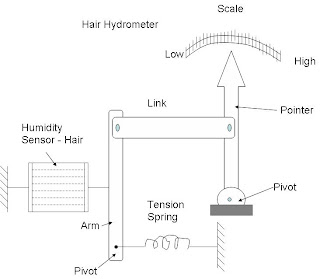Basic Principle
Due to humidity, several materials experience a change in physical, chemical and electrical properties. This property is used in transducer that are designed and calibrated to read relative humidity directly.Hair hydrometer is a type of absorption hydrometer and uses the mechanical humidity sensing technique.
Certain hygroscopic materials such as human hair, animal membranes, wood, paper, etc., undergo changes in linear dimensions when they absorb moisture from their surrounding air. This change in linear dimension is used as the measurement of humidity present in air.
Description of Hair Hydrometer
The main Parts of hair hydrometer are, Human hair is used as the humidity sensor. The hair is arranged in parallel beam and they are separated from one another to expose them to the surrounding air/atmosphere. Number of hairs are placed in parallel to increase mechanical strength.
Human hair is used as the humidity sensor. The hair is arranged in parallel beam and they are separated from one another to expose them to the surrounding air/atmosphere. Number of hairs are placed in parallel to increase mechanical strength.This hair arrangement is placed under small tension by the use of a tension spring to ensure proper functioning.
The hair arrangement is connected to an arm and a link arrangement and the link is attached to a pointer pivoted at one end. The pointer sweeps over a humidity calibrated scale.
Operation of Hair Hydrometer
When the humidity of air is to be measured, this air is made to surround the hair arrangement and the hair arrangement absorbs the humidity from the surrounding air and expands or contracts in the linear direction.This expansion or contraction of the hair arrangement moves the arm & link and thus the pointer to a suitable position on the calibrated scale and thus indicating the humidity present in the air/atmosphere.
Note: These Hair hydrometers are called membrane hydrometers when the sensing element is a membrane.
Applications of Hair Hydrometer
These hydrometers are used in the temperature range of 0’C to 75’C.These hydrometers are used in the RH (Relative Humidity) range of 30 to 95%.
Limitations of Hair Hydrometer
These Hydrometers are slow in ResponseIf the Hair hydrometer is used constantly, its calibration tends to change.